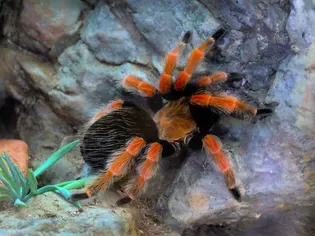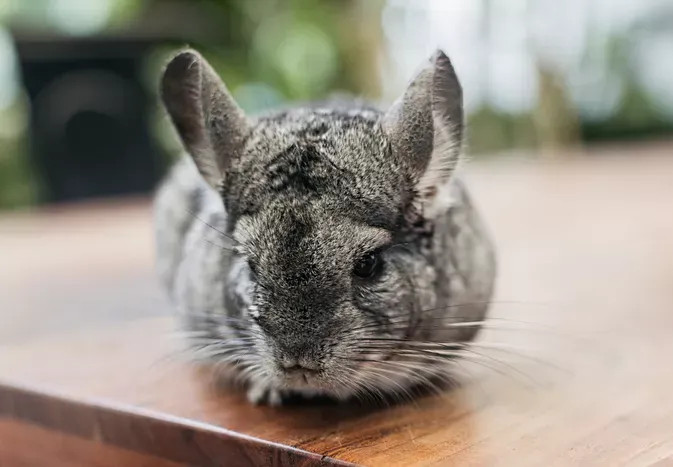Worms or Parasites That Can Get Your Reptile Sick
Updated on 05/26/24

Worms and Parasites: The Silent Threat to Your Reptile's Health
Reptiles, like any other living creature, can fall victim to a variety of health issues. Among the most common and potentially dangerous are worms and parasites. These uninvited guests can wreak havoc on your pet's digestive system, skin, and overall well-being. As a responsible reptile owner, it's imperative that you stay vigilant against these threats and take proactive steps to protect your scaly companion. Here's everything you need to know about the worms and parasites that can infect reptiles, their symptoms, and how to keep your pet safe from these insidious invaders:
Meet the Worms and Parasites Lurking in Your Reptile's World
The realm of worms and parasites that target reptiles is vast and diverse. Each type poses unique risks and challenges, so it's essential to be aware of the most prevalent ones:
Internal Worms:
- Roundworms (Nematodes): These common intestinal parasites are found in a wide range of reptiles. They can cause a variety of symptoms, including diarrhea, vomiting, weight loss, and lethargy. In severe cases, roundworms can lead to intestinal blockage or even death.
- Hookworms: These nasty parasites attach themselves to the lining of your reptile's intestines, feeding on its blood. They can cause severe anemia, weakness, and weight loss.
- Tapeworms: These long, segmented worms inhabit the intestines of reptiles. Tapeworms absorb nutrients from your pet's food, leading to malnutrition and weight loss.
- Whipworms: These parasites reside in the cecum, a pouch-like structure connected to the large intestine. Whipworms can cause diarrhea, weight loss, and anemia.
External Parasites:
- Mites: These tiny creatures attach themselves to your reptile's skin, feeding on its blood and body fluids. Mites can cause intense itching, skin irritation, and hair loss.
- Ticks: Ticks are external parasites that feed on blood. They can transmit diseases to reptiles, including Lyme disease and Rocky Mountain spotted fever.
- Fleas: Fleas are common parasites that can infest reptiles. They can cause irritation, itching, and allergic reactions.
Symptoms: The Telltale Signs of Worms and Parasites
Spotting the signs of worms and parasites in reptiles can be challenging, as they often remain hidden. However, there are several telltale symptoms that can alert you to a potential problem:
- Gastrointestinal issues: Diarrhea, vomiting, and weight loss are common symptoms of internal worms.
- Skin problems: Mites and other external parasites can cause itching, skin irritation, hair loss, and scabs.
- Lethargy and weakness: Worms and parasites can drain your reptile's energy, leading to lethargy and weakness.
- Anemia: Pale gums or skin can indicate anemia caused by hookworms or other parasites that feed on blood.
- Poor appetite: Loss of appetite can be a sign of worms or parasites competing for your reptile's food.
Treatment: Ridding Your Reptile of Unwanted Guests
If you suspect your reptile has worms or parasites, it's crucial to seek veterinary care promptly. Your veterinarian will perform a physical examination, review your pet's medical history, and conduct tests to diagnose the specific type of parasite. Based on the diagnosis, they will prescribe the appropriate treatment, which may include:
- Anthelmintics: These medications are designed to kill worms and parasites. They are typically administered orally or through injection.
- Topical treatments: Shampoos, creams, and sprays can be used to treat external parasites like mites and ticks.
- Environmental sanitation: Cleaning and disinfecting your reptile's enclosure is essential to prevent reinfection.
Prevention: Safeguarding Your Reptile from Parasitic Invaders
As they say, prevention is the best medicine, and this rings true in the case of worms and parasites in reptiles. Here are some proactive measures you can take to protect your pet:
- Regular veterinary checkups: Routine vet exams allow your veterinarian to screen for parasites and provide preventive care.
- Quarantine new reptiles: Isolate new reptiles for a period of time before introducing them to your existing collection. This helps prevent the spread of parasites.
- Practice good hygiene: Wash your hands thoroughly before and after handling your reptile. Clean and disinfect their enclosure regularly to eliminate potential sources of infection.
- Use parasite control products: There are various parasite control products available for reptiles, such as topical treatments and environmental sprays. Follow the manufacturer's instructions carefully for safe and effective use.
- Feed a healthy diet: A nutritious diet helps boost your reptile's immune system, making them less susceptible to parasite infections.
Conclusion: A Healthy Reptile, a Happy Owner
Worms and parasites pose a significant threat to the health of your beloved reptile. By understanding the different types of parasites, recognizing the symptoms, and implementing effective prevention strategies, you can help protect your scaly companion from these dangerous invaders. Remember, a healthy reptile is a happy reptile, and your vigilance will ensure they thrive for many years to come.
Explore More Pets

Exotic Pet Species
Should You Keep a Chimpanzee as a Pet?

Exotic Pet Species
Should You Keep a Raccoon as a Pet?

Exotic Pet Species
How to Care for a Pet Mexican Red-Knee Tarantula

Exotic Pet Species
12 Best Exotic Pets for Apartment Living

Exotic Pet Species
Best Foxes to Keep as Pets

Exotic Pet Species
Should You Keep a Northern Flying Squirrel as a Pet?

Exotic Pet Species
Should You Keep Stick Insect as a Pet?

Exotic Pet Species
Should You Keep a Big Cat as a Pet?
